
This is a list of notable events in music that took place in the year 1950.
"Walkin' My Baby Back Home" is a popular song written in 1930 by Roy Turk (lyrics) and Fred E. Ahlert (music).
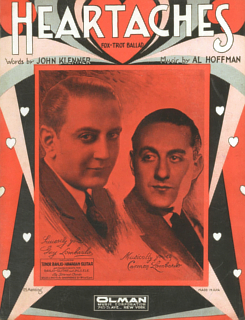
"Heartaches" is a song written by composer Al Hoffman and singer John Klenner and originally published in 1931. A fast-tempo instrumental version of the song by Ted Weems and his Orchestra became a major hit in 1947, topping the Billboard Best Selling Singles chart. Later versions by band leader Harry James and doo-wop group the Marcels were also chart successes. "Heartaches" received renewed attention in the 2010s after several 1930s recordings of the song, including a version by Sid Phillips & his Melodians with Al Bowlly, were sampled in the Caretaker's album Everywhere at the End of Time.
"If (They Made Me a King)" is a popular song with music written by Tolchard Evans and the lyrics written by Robert Hargreaves and Stanley J. Damerell. The song was written in 1934, but the most popular versions were recorded in 1950–1951. Perry Como's version, recorded November 28, 1950, was a number-one hit on the Billboard charts for eight weeks. The Como version was released under the following labels and catalog numbers:
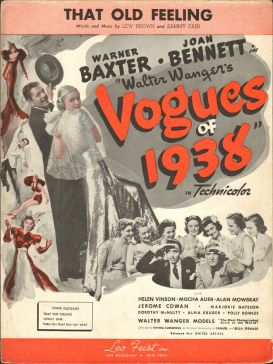
"That Old Feeling" is a popular song about nostalgia written by Sammy Fain, with lyrics by Lew Brown. It was published in 1937.
"If I Knew You Were Comin' I'd've Baked a Cake" is a popular song written by Al Hoffman, Bob Merrill, and Clem Watts and published in 1950.
"You're Just in Love" is a popular song by Irving Berlin. It was published in 1950 and was first performed by Ethel Merman and Russell Nype in Call Me Madam, a musical comedy that made its debut at the Imperial Theatre in New York City on October 12 that year. The show ran for 644 performances. Ethel Merman also later starred in the 1953 film version, with Donald O'Connor.
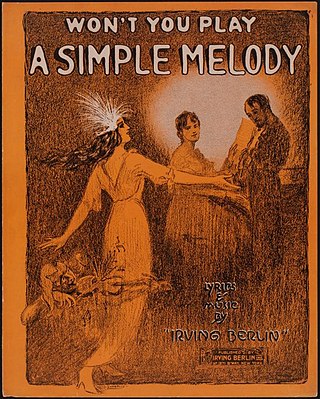
"Play a Simple Melody" is a song from the 1914 musical, Watch Your Step, with words and music by Irving Berlin. The show was the first stage musical that Berlin wrote. It ran for 175 performances at the New Amsterdam Theater in New York City. The one song from the show that is well-remembered today is "Play a Simple Melody," one of the few true examples of counterpoint in American popular music — a melody running against a second melody, each with independent lyrics. In the printed music, first the "simple melody" plays alone. Then comes the contrasting melody. Finally, the two play together. The lyrics of "Play a Simple Melody" also track the counterpoint duet in that one singer yearns for the music which mother sang, but the other singer disdains such classic fare as lacking interest and rhythm. When "Play a Simple Melody" was published, ragtime was in its heyday, led by its most consummate composer, Scott Joplin. In a famous 1916 recording of the song, while Elsie Baker wants what she considers simplicity, Billy Murray explicitly asks for "rag". The song was also recorded by Walter Van Brunt and Mary Carson in 1915.
"Nevertheless I'm in Love with You" is a popular song written by Harry Ruby with lyrics by Bert Kalmar, first published in 1931. The song was a hit for Jack Denny in 1931, and was revisited in 1950 by The Mills Brothers, Paul Weston, Ray Anthony, Ralph Flanagan, Frankie Laine and Frank Sinatra, with perhaps the most compelling version being that of the McGuire Sisters.

The Big Broadcast of 1936 is a 1935 American comedy film directed by Norman Taurog, and is the second in the series of Big Broadcast movies. The musical comedy starred Jack Oakie, Bing Crosby, George Burns, Gracie Allen, Ethel Merman, The Nicholas Brothers, Lyda Roberti, Wendy Barrie, Mary Boland, Charlie Ruggles, Akim Tamiroff, Amos 'n' Andy, Bill "Bojangles" Robinson, and Argentinian tango singer Carlos Gardel.
"Charmaine" is a popular song written by Ernö Rapée and Lew Pollack. The song was written in 1926 and published in 1927. However, Desmond Carrington on his BBC Radio 2 programme marked the song's writing as being in 1913.
"I Said My Pajamas (and Put On My Pray'rs)" is a popular song with music by George Wyle and lyrics by Edward Pola. It was published in 1949. The song describes somebody who is in love, but whose descriptions about what she does are full of switcheroos, indicating her absentmindedness.
"Imagination" is a popular song with music written by Jimmy Van Heusen and the lyrics by Johnny Burke. The song was first published in 1940. The two best-selling versions were recorded by the orchestras of Glenn Miller and Tommy Dorsey in 1940.

Here's to the Ladies is an album by Tony Bennett, released in 1995.
"How Deep Is the Ocean?" is a popular song written by Irving Berlin in 1932. The song was developed from an earlier Berlin song "To My Mammy" which was sung by Al Jolson in his film Mammy (1930). In the earlier song, the lyrics include the questions "How deep is the ocean? / How high is the sky?" and this was the genesis of "How Deep Is the Ocean?".
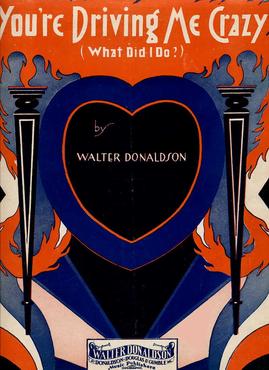
"You’re Driving Me Crazy" is an American popular song composed by Walter Donaldson in 1930 and recorded the same year by Lee Morse, Rudy Vallée & His Connecticut Yankees and Guy Lombardo & His Royal Canadians.
The Chez Paree was a Chicago nightclub known for its glamorous atmosphere, elaborate dance numbers, and top entertainers. It operated from 1932 until 1960 in the Streeterville neighborhood of Chicago at 610 N. Fairbanks Court. The club was the epitome of the golden age of entertainment, and it hosted a wide variety of performers, from singers to comedians to vaudeville acts. A "new" Chez Paree opened briefly in the mid-1960s on 400 N. Wabash Avenue and was seen in the film Mickey One with Warren Beatty.
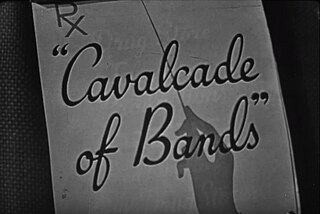
Cavalcade of Bands is an early 1950s American television series which aired on the now defunct DuMont Television Network.
Ray's a Laugh was a British comedy series starring comedian Ted Ray which ran on BBC Radio from 1949 to 1961. According to latter-day historians of the era, the show was "hugely popular with the British public" and "one of the major hits of post-war radio comedy".

The Stage Door Canteen was an entertainment venue for American and Allied servicemen that operated in the Broadway theatre district of New York City throughout World War II. Founded by the American Theatre Wing (ATW) in 1942, the entertainers were largely unpaid; volunteering their talents as a way of supporting the morale of American troops during the war. Several women in leadership with the ATW played a critical role in establishing the Stage Door Canteen, including actress Nedda Harrigan and ATW co-founders Louise Heims Beck and Antoinette Perry. The canteen opened March 2, 1942 and operated seven nights a week in the previously unoccupied Little Club under the 44th Street Theatre at 216 West 44th Street in Manhattan.








